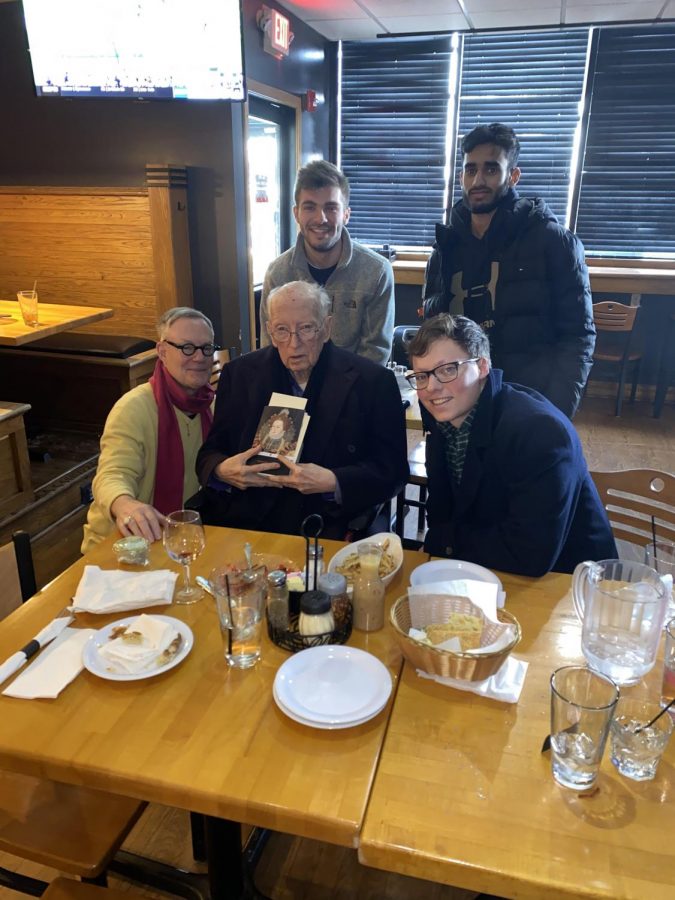In Memoriam: Thomas P. Roche
Tom Roche (center) with his husband, Bo Smith. Also picture are students Joe Clark ’21, Vineet Reddy ’20 and Dave Meredith ’21.
Mar 19, 2021
As a man whose name precedes him and who made history with many “firsts” — like compiling and editing Edmund Spenser’s 16th-century trilogy “The Faerie Queene” into one print, or being the first American student of the renowned C.S. Lewis while at Cambridge –– late JCU professor Thomas P. Roche embodied the Catholic, Jesuit ideals of John Carroll University.
Roche, who passed away on May 3, was many things, but among them, he was a teacher. Roche, an English professor who taught at Princeton for over 40 years, followed by Arizona State, the University of Notre Dame and our beloved John Carroll University, was lauded everywhere he taught. Always finding great intrigue with his students, Roche developed impactful relationships with every class.
Eventually, he expanded his teaching of literature to incorporate an acting portion, specifically in Shakespeare. Roche and his colleague Bo Smith, who still teaches at Carroll, started co-teaching at Princeton, before they began hopping around from school to school to teach their acting class. Bo, an excellent actor, partnered well with Roche right from the jump, and the two lived out an excellent legacy throughout their careers as professors.
Taking their class (fortunately, one of many) my freshman year, I got to know Tom and Bo very well. Prior to writing this piece, I had a beautiful conversation with Bo about all that Tom was.
For over 20 years, Tom worked on editing and compiling “The Faerie Queene,” which consists of about 36,000 lines. When Bo asked Tom how he managed to do SO much work, Tom calmly replied, “I just worked on it all the time.” Bo explained that this exemplified Tom’s character: he was a hard-working (Bo contends the hardest working ever) and dedicated man.
Tom was always working on something, whether writing books or crafting critical essays, Bo recalled. Tom was not one to become daunted by such gargantuan tasks because he was poised and a man of great, remarkable faith.
Concluding his teaching career at a Catholic, Jesuit school only seemed fitting for Roche. A man for others himself, Roche embodied many of the Jesuit ideals. The notion of magis, which means expecting more from oneself for the betterment of the world, comes to mind. In addition to magis, Tom lived out the meaning of cura personalis, or “care for the entire person” — another Jesuit phrase that prioritizes the needs of others.
One time, Tom noticed a student was struggling; the student was seemingly unwell and had stopped attending classes. So, Tom took the initiative and reached out to the student with a passionate, but peaceful, email in order to support the student and encourage the student to attend classes and receive help. Reflecting on the experience, that student referred to Tom as “a hero.” And that he was. Tom was a hero to everyone.
For a man who attended an all-day event celebrating his life (there were literally NINE straight hours of speeches about him), Tom remained grounded and surely did not let the praise get to his head … well, at least not too much! Once, when confronted by a standoffish faculty member at a previous university about why Tom took students out to eat or drink, Tom snappily replied, “Because students are far more interesting than faculty” and proceeded on. His cleverness was undeniable.
In accordance with the Jesuit value of education and educating others, Tom taught until the end of his magnificent life. For the sake of numbers, assuming that Tom taught at least three classes of 15 students each year (a severe understatement, given that his first acting class was taken by 250 students at Princeton), then Tom directly taught, and in turn influenced, more than 2,500 students. Clearly, he delivered on the Jesuit principle of educating others and oneself.
If one were lucky enough to know Tom (and Bo, of course), then one might recollect that Tom adored the liquid jet fuel that is Italian Grappa. Tom was a man of great energy and complete wit. When Bo shared a story of Tom’s younger self, which usually pertained to some wild, perhaps troublesome experience of Tom’s, Tom would simply reply, “No. I don’t recall [that happening]”!
Tom, thank you for all that you have done for the John Carroll community, the Spenserian world and, most of all, your beloved students. I hope that you’re sipping your jet fuel Grappa in peace. On behalf of those you’ve impacted so greatly, we love you. Cheers!
“For whatsoever from one place doth fall,
Is with the tide unto another brought:
For there is nothing lost, that may be found, if sought.”
–Edmund Spenser’s “The Faerie Queene”













Brandon J Lund • Jun 10, 2023 at 10:39 am
Thank you for posting this. I studied with Professor Roche at Arizona State University as an undergrad. What a great man, him and Bo! I have often thought of Tom since I graduated in 2007 and how his academic ideals exceed me (I not have yet gone back to get my Master’s degree and am the poorer for it; I did not know enough at the time to stay in and get it all at once). “Be like me,” Tom often implied to me when we would talk about our future in university. “I belong here.” That’s usually what Professor Roche said to me: You never have to leave university if you love it so much. Wow, I didn’t know he edited the Fairy Queen for Penguin until I bought it a few years back and discovered it on accident. Look at him there (with Bo), you bet Professor Roche! A great scholar and still a little bit famous also!